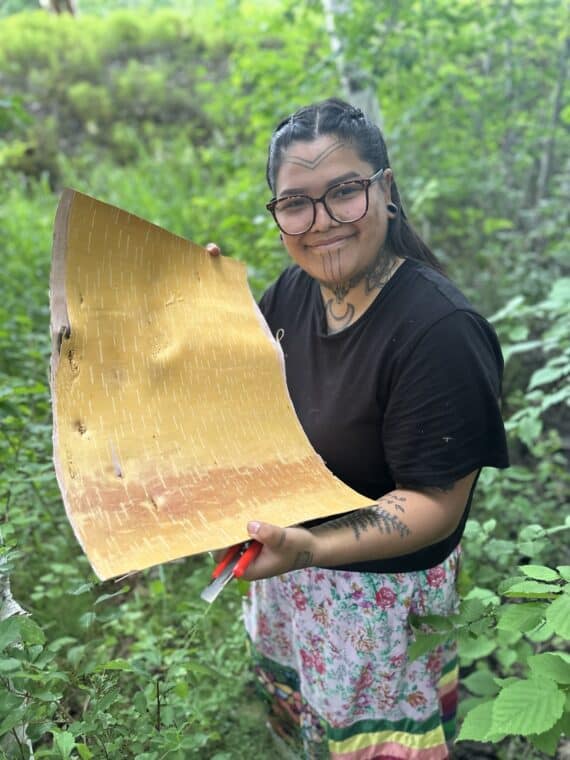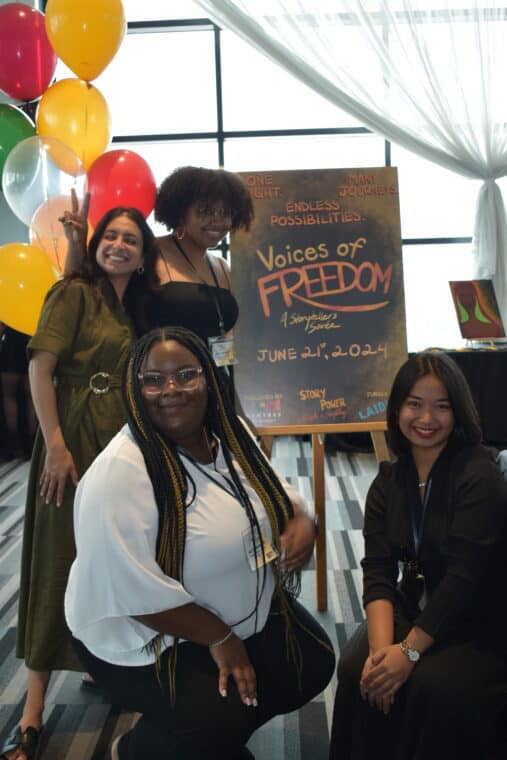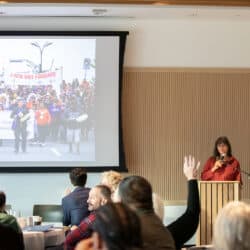Systemic inequities represent real barriers that prevent young people from reaching their full potential. Five initiatives inspired by the work of Laidlaw Foundation grantees and advisory committees show a path forward.
In Ontario, a troubling narrative persists – one of systemic inequities that disproportionately affect Black, Indigenous, and racialized youth. Shaped by both historical and ongoing policing practices, these inequities manifest in various forms, from overrepresentation in foster care and underperformance in education to disproportionate interactions with the justice system. These issues represent real barriers that hinder young people from reaching their full potential.
Recognizing the urgent need for change, in November 2023 Laidlaw Foundation released a report titled The State of Black and Indigenous Youth in Ontario: An Examination of the Experiences and Impacts of Policing on Black, Indigenous & Racialized Youth. This report explores some of the harsh realities and the broader impacts of policing, extending beyond law enforcement to include ways that educators, employers, and the general public monitor and control these communities. This over-policing and under-serving only deepen existing inequities.
By focusing on targeted interventions and community-driven support efforts, we can dismantle entrenched barriers and create lasting change.
Amidst these challenges, there is a path forward. The report provides actionable solutions through a series of calls to action designed to address these systemic issues and empower Black and Indigenous youth. By focusing on targeted interventions and community-driven support efforts, we can dismantle entrenched barriers and create lasting change. For a more just and inclusive Ontario, collaboration across all sectors – philanthropic organizations, government bodies, and local communities – is essential.
This article delves into five key initiatives inspired by the work of Laidlaw Foundation grantees and advisory committees. These efforts go beyond policy change; they aim to transform lives and inspire a brighter future for all.
Amplifying Black and Indigenous youth leadership
One pivotal approach is amplifying the leadership of Black and Indigenous youth, which stands as a critical pillar for influencing community-driven change. By investing in initiatives led by these young leaders, organizations can enable them to address the specific challenges facing their communities. The Assembly of Seven Generations (A7G) in Ottawa exemplifies this approach, offering a rich tapestry of programs that prioritizes both cultural preservation and skill development.
This dual focus on material support and personal growth enables young leaders to make culturally informed contributions to their communities.
This organization, formed by young people from various Indigenous nations, provides opportunities for meaningful engagement and a platform for a national Indigenous youth voice. Throughout the year, they organize several youth-led programs where many former participants return to lead and support new projects. By backing these initiatives, communities can foster change deeply rooted in the lived experiences and perspectives of those most affected by systemic injustices. This investment not only provides vital financial support but also empowers young Indigenous individuals to take on leadership roles addressing community issues in ways that are true to their cultural values and lived experiences. This dual focus on material support and personal growth enables young leaders to make culturally informed contributions to their communities, while also building resilience and solidarity within communities facing systemic challenges.
Investing in culturally relevant programming
Tailoring programs to the unique cultural backgrounds and experiences of Black and Indigenous youth is essential for promoting their well-being and success. Investing in initiatives that prioritize cultural identity, education, and career development ensures that the youth feel valued and supported in their communities. For example, organizations like Endaayaan Awejaa in North Bay work tirelessly to promote and preserve cultural practices and traditional knowledge, providing youth with opportunities to connect with their heritage, build a sense of pride, and enhance resilience.

For Indigenous youth, connecting with their cultural heritage is a deeply transformative experience, offering a sense of belonging and purpose. Endaayaan Awejaa facilitates this connection through language revitalization, storytelling, traditional crafts, and ceremonial practices. These efforts not only support personal growth but also play a vital role in addressing intergenerational trauma resulting from colonialism and assimilation policies. By reclaiming and revitalizing cultural practices, such organizations contribute to the healing and empowerment of Indigenous communities, fostering connections across generations and preserving Indigenous knowledge for future generations.
Addressing systemic barriers
Advocating for policy reforms and supporting initiatives aimed at dismantling systemic barriers is crucial for creating a more equitable society. By tackling discriminatory practices within the criminal justice, education, and child welfare systems, organizations can work toward eliminating the root causes of inequality and injustice. This work is essential because it addresses foundational issues that perpetuate disparities and prevent communities from achieving equal opportunities and outcomes.
Projects like the Restoration and Empowerment for Social Transformation (REST) Centres in Brampton exemplify the power of community-led efforts in challenging systemic oppression. REST Centres, a B3 organization (Black-led, Black-focused, and Black-serving), aims to narrow the gap in services available to Black youth experiencing or at risk of homelessness. It provides wrap-around services (a comprehensive, coordinated approach to providing support that addresses a wide range of needs for individuals and communities facing complex challenges) coupled with housing supports to Black youth, primarily those aging out of the child welfare system. Through its Bridge of Hope program, REST provides housing options that are essential for fostering a secure and supportive environment. This program, combined with REST’s wrap-around services, ensures that youth have access to safe housing, education, employment opportunities, and mental health support, paving the way for a successful transition to independent living. This comprehensive support addresses immediate needs while also promoting long-term stability and independence.
By tackling discriminatory practices within the criminal justice, education, and child welfare systems, organizations can work toward eliminating the root causes of inequality and injustice.
REST Centres also raises awareness about the issues faced by Black youth in care and advocates for changes to eliminate housing insecurity in Peel Region. This dual approach – providing immediate support and advocating for systemic reform – ensures that while individual needs are addressed, efforts are also made to change the underlying structures that contribute to inequality.

A Peel Region report highlights that Black youth make up 28% of the homeless youth population while constituting only 9% of the overall population in the region. This stark disparity underscores the importance of REST’s mission and the critical need for targeted interventions.
By addressing systemic barriers and providing crucial support to vulnerable populations, organizations like REST Centres play an essential role in fostering social equity and empowering Black communities. Their efforts help to create a more just and inclusive society, where all individuals have the opportunity to thrive, regardless of their background or circumstances.
Providing early intervention and support
Providing mentorship and support to youth is essential for preventing their involvement in the criminal justice system and promoting positive academic and life outcomes. Black-led initiatives like Success Beyond Limits play a pivotal role in this effort by offering comprehensive supports tailored to the needs of Black youth. A six-week summer program in Toronto’s Jane-Finch area, for instance, includes school credits, mentorship, youth employment opportunities, enrichment classes, nutrition classes, engagement, graduation supports, and relationship-building. These multifaceted programs address external factors that have a negative impact on educational success and empower youth to overcome systemic barriers.
Success Beyond Limits provides consistent support throughout the school day and runs after-school programs that connect students with diverse opportunities.
The impact of organizations like Success Beyond Limits is profound, particularly in their emphasis on early intervention and ongoing support for youth. By operating a dedicated youth space at Westview Centennial Secondary School, Success Beyond Limits provides consistent support throughout the school day and runs after-school programs that connect students with diverse opportunities. This continuous engagement helps students navigate challenges, access educational resources, and build supportive relationships.
Investing in early intervention programs is essential for dismantling systemic inequities. By addressing the root causes of vulnerability and delivering targeted support, these initiatives create pathways to success for youth who encounter systemic barriers to achievement. Organizations like Success Beyond Limits contribute to building stronger, more resilient communities by empowering Black youth and guiding them toward positive life trajectories. This holistic approach not only benefits individual students, but also fosters broader social and community resilience.
Fostering community engagement and empowerment
Establishing avenues for meaningful engagement with Black and Indigenous communities is vital for ensuring that their voices are heard and their needs are met. By engaging youth, parents, elders, and community leaders in decision-making processes, organizations can build trust and strengthen relationships within the community. Laidlaw Foundation’s Indigenous Advisory Committee, consisting of Indigenous youth from across Ontario, provides valuable insights and guidance, ensuring that funding strategies align with the needs and priorities of Indigenous communities across the province. Additionally, Laidlaw’s board granting committee includes Black and Indigenous external advisors and board members, who have lived or work experience in the systems the foundation prioritizes (child welfare, criminal justice, and education). This diverse representation enriches the decision-making process with varied perspectives and expertise.
Funding strategies are informed by traditional knowledge, community-specific needs, and historical contexts.
The involvement of Indigenous communities in shaping their futures underscores the importance of community engagement. The Indigenous Advisory Committee, along with Black and Indigenous representation on the granting committee and board, ensures that resources are allocated in a culturally sensitive and responsive manner. This means that funding strategies are informed by traditional knowledge, community-specific needs, and historical contexts, addressing the unique challenges and opportunities faced by Indigenous Peoples. For example, resources might be directed toward initiatives that support language revitalization, cultural preservation, or community-led health programs, reflecting the direct input of those who understand the community’s needs best.
This approach promotes empowerment, fosters a sense of ownership, and contributes to building more resilient and self-sustaining communities. By involving a diverse range of stakeholders, organizations like Laidlaw Foundation build trust, strengthen relationships, and foster collaboration. The meaningful engagement of Indigenous communities ensures that their voices are heard and enables them to reclaim control over their destinies, working toward a more just and inclusive future.
Conclusion
In the face of systemic inequities that continue to marginalize Black, Indigenous, and racialized youth in Ontario, the imperative for action is clear. By prioritizing the five key initiatives outlined in this article – amplifying youth leadership, investing in culturally relevant programming, addressing systemic barriers, providing early intervention and support, and fostering community engagement and empowerment – we can work toward a more just and inclusive society.
These initiatives represent not only a commitment to equity but also a recognition of the resilience and potential of Black and Indigenous youth. Through collaboration and investment in community-driven solutions, we have the power to dismantle entrenched barriers and create opportunities for all youth to thrive.
As we move forward, let us remain steadfast in our commitment to justice and equity. Listen to the voices of Black and Indigenous youth, centre their experiences, and empower them to lead the way toward a brighter future. Together, we can build a more equitable Ontario where every young person has the opportunity to realize their full potential.

